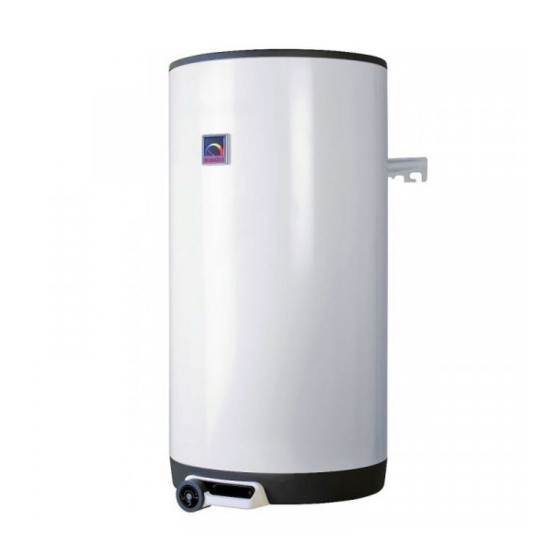Drazice OKC 125/1 m2 운영 및 설치 매뉴얼 - 페이지 4
{카테고리_이름} Drazice OKC 125/1 m2에 대한 운영 및 설치 매뉴얼을 온라인으로 검색하거나 PDF를 다운로드하세요. Drazice OKC 125/1 m2 20 페이지.

1 PRODUCT TECHNICAL SPECIFICATION
1.1 FUNCTION DESCRIPTION
The heater is designed for the so-called accumulation heating of service water by electric energy, or by
thermal energy through exchanger. Water is heated by an electric element or heat exchanger in an
enamelled thermally insulated tank at the time specified by the electricity supplier. At the time of the
heating, the element is controlled by thermostat on which the desired temperature can be set (ranging
from 5 and 74℃). Once the selected temperature is reached, heating interrupts automatically. Water
accumulated in the tank is then used for consumption. The tank keeps constant pressure of water from the
water main. If the combination faucet hot water valve is opened, water from the water supply conduit
pressed out by cold water pressure flows out of the heater. Hot water flows out through the top part, and
water flowing in remains in the bottom part of the heater. Pressure principle allows hot water withdrawal
at any place from the heater (Fig. 6).
1.2 ADVICE FOR CUSTOMERS
1.2.1 HOT WATER CONSUMPTION
Consumption of hot water in households depends on the number of people, amount of
sanitary equipment, length, diameter and insulation of piping in the flat, or on individual
habits of users. The cheapest option of water heating comes at the time when the
electricity rate is reduced.
Find out in what time intervals your electricity supplier provides reduced tariff and,
depending on that information, select relevant volume and power input of the heater so that
your hot water consumption covered the needs of your household.
1.2.2 ENERGY SAVING
Hot utility water reservoir is insulated by means of top-quality polyurethane foam with zero
CFCs content. Adjust the temperature of the heater's thermostat to that level only that you
need to run your home. Thus you will reduce electricity consumption, as well as the amount
of lime sediments on the walls of the receptacle and on the heat exchanger.
- 4 -
